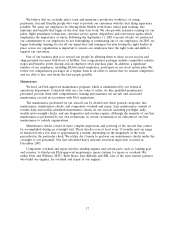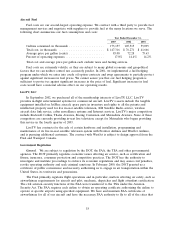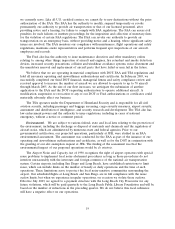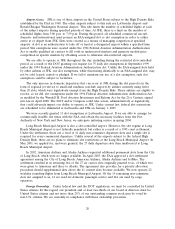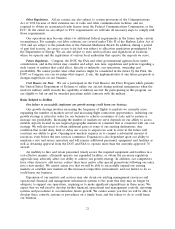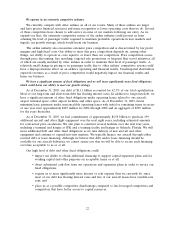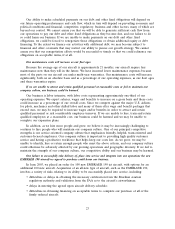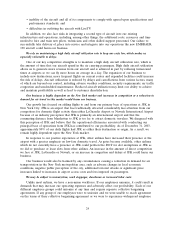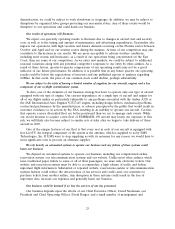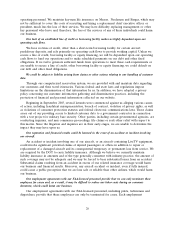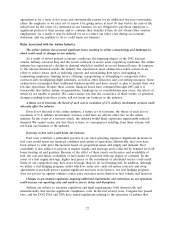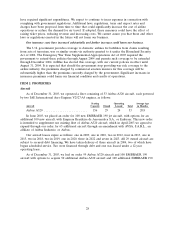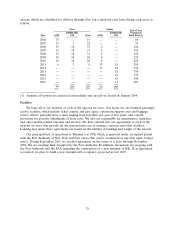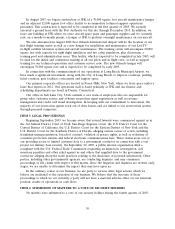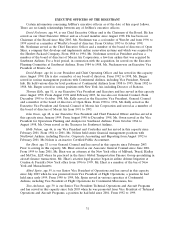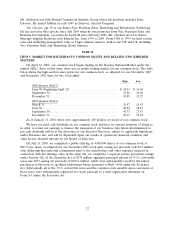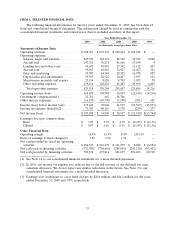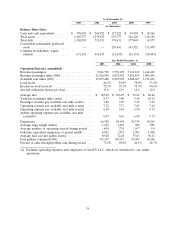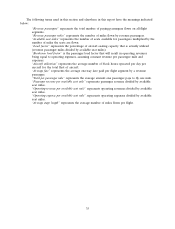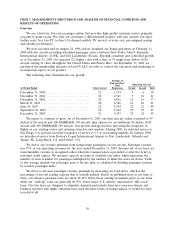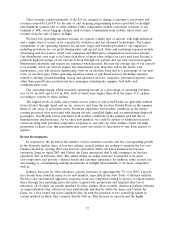JetBlue Airlines 2003 Annual Report Download - page 30
Download and view the complete annual report
Please find page 30 of the 2003 JetBlue Airlines annual report below. You can navigate through the pages in the report by either clicking on the pages listed below, or by using the keyword search tool below to find specific information within the annual report.agreement is for a term of five years and automatically renews for an additional five-year term unless
either the employee or we elect not to renew it by giving notice at least 90 days before the end of the
initial term. In the event of a downturn in our business, we are obligated to pay these employees a
significant portion of their income and to continue their benefits if they do not obtain other aviation
employment. As a result, it may be difficult for us to reduce our labor costs during an economic
downturn, and our inability to do so could harm our business.
Risks Associated with the Airline Industry
The airline industry has incurred significant losses resulting in airline restructurings and bankruptcies,
which could result in changes in our industry.
As a result of slower general economic conditions, the lingering impact of the 2001 terrorist
attacks, military action in Iraq and the recent outbreak of severe acute respiratory syndrome, the airline
industry has experienced a decline in demand which has resulted in record financial losses. In response
to the adverse financial results the industry has experienced, most airlines have taken actions in an
effort to reduce losses, such as reducing capacity and rationalizing fleet types, furloughing or
terminating employees, limiting service offerings, renegotiating or attempting to renegotiate labor
contracts and reconfiguring flight schedules, as well as other efficiency and cost-cutting measures. Some
airlines have reexamined their traditional business models and have created or plan to launch their own
low-fare operations. Despite these actions, financial losses have continued through 2003 and it is
foreseeable that further airline reorganizations, bankruptcies or consolidations may occur; the effects of
which we are unable to predict. We cannot assure you that the occurrence of these events, or potential
changes resulting from these events, will not harm our business or the industry.
A future act of terrorism, the threat of such acts or escalation of U.S. military involvement overseas could
adversely affect the industry.
Even if not directed at the airline industry, a future act of terrorism, the threat of such acts or
escalation of U.S. military involvement overseas could have an adverse effect the on the airline
industry. In the event of a terrorist attack, the industry would likely experience significantly reduced
demand. We cannot assure you that these actions, or consequences resulting from these actions, will
not harm our business or the industry.
Increases in fuel costs would harm our business.
Fuel costs constitute a substantial portion of our total operating expenses. Significant increases in
fuel costs would harm our financial condition and results of operations. Historically, fuel costs have
been subject to wide price fluctuations based on geopolitical issues and supply and demand. Fuel
availability is also subject to periods of market surplus and shortage and is affected by demand for both
home heating oil and gasoline. Because of the effect of these events on the price and availability of
fuel, the cost and future availability of fuel cannot be predicted with any degree of certainty. In the
event of a fuel supply shortage, higher fuel prices or the curtailment of scheduled service could result.
Some of our competitors may have more leverage than we do in obtaining fuel. In addition, although
we utilize a fuel hedging program, under which we enter into crude oil option contracts and swap
agreements to partially protect against significant increases in fuel prices, our fuel hedging program
does not protect us against ordinary course price increases and is limited in fuel volume and duration.
Changes in government regulations imposing additional requirements and restrictions on our operations
could increase our operating costs and result in service delays and disruptions.
Airlines are subject to extensive regulatory and legal requirements, both domestically and
internationally, that involve significant compliance costs. In the last several years, Congress has passed
laws, and the DOT, FAA and TSA have issued regulations relating to the operation of airlines that
27


